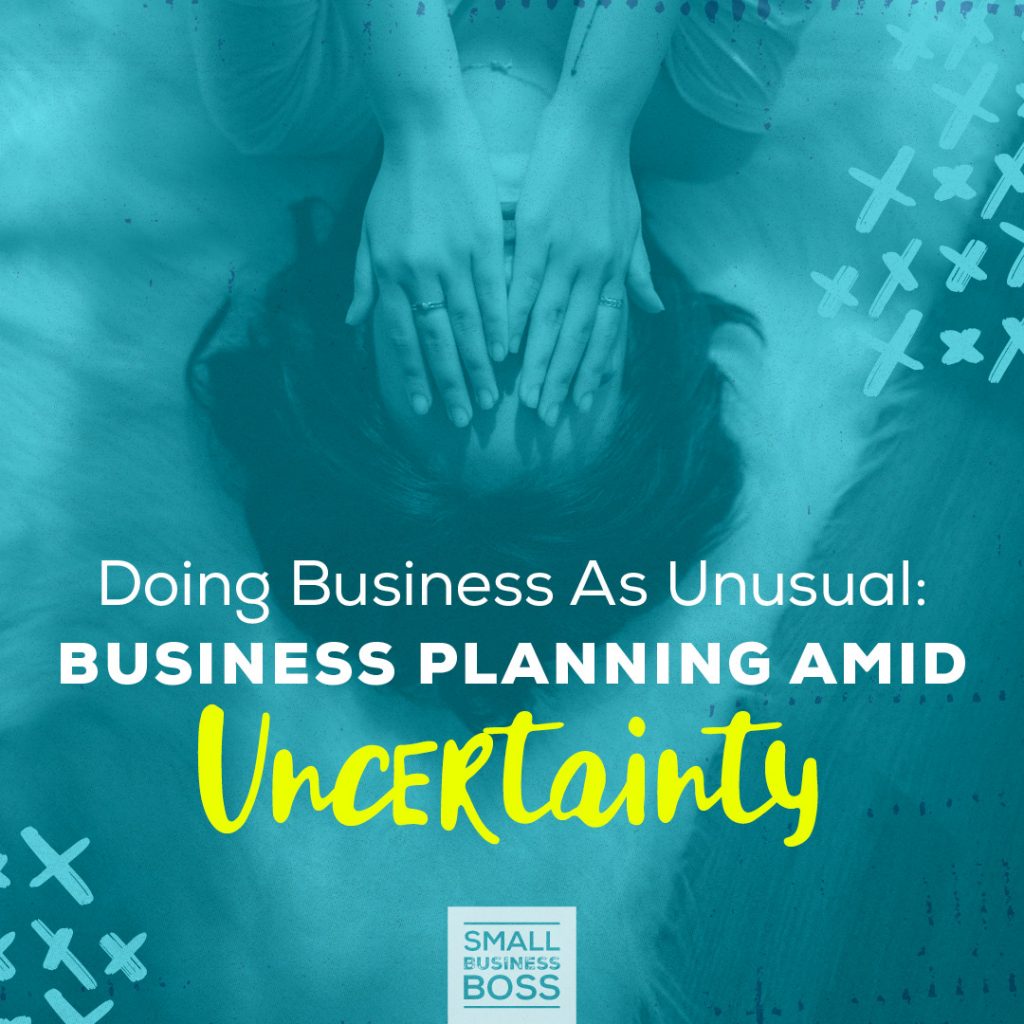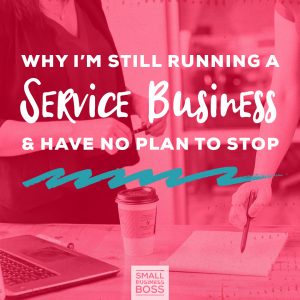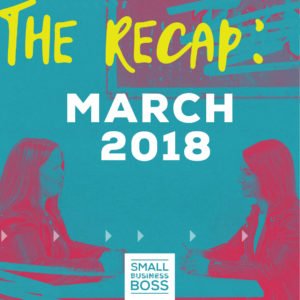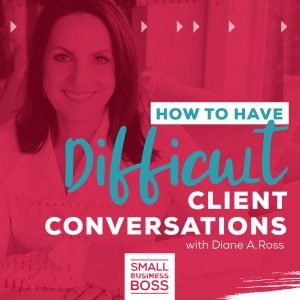
Search the site:
Episode 209: Doing Business As Unusual: Business Planning Amid Uncertainty
Things are pretty far from business as usual right now, so do we even bother with planning right now? The answer is yes. We definitely need to plan. In this episode, we’re going to look at how to plan differently as we head into Q2 amid a global pandemic.
Welcome to a new series here on the podcast, where we’re going to explore doing business as unusual.
With COVID-19, there’s no pretending that our lives and our businesses are normal right now, so instead of publishing the episodes I’ve already recorded, I wanted to do this series to address what’s happening right now.
Before we dive in, I want to preface all of this with the fact that in this, I’m aiming to speak from my lived experience as a business owner and marketing professional as much as humanly possible. Right now, we’re being inundated with advice from well-meaning would-be experts who really don’t know what they’re talking about.
You don’t need more of that. You really don’t. Nope.
The truth: No one really knows what’s going to happen and I’m no exception.
What I can do right now is share what I’m doing, while pulling in past, lived experiences where relevant.
As part of that, I want to acknowledge that in a past episode, I shared lessons and insights from the 2008 recession. To some degree, those lessons are relevant, but based on the reading I’ve been doing (this is where the politics and economics nerd I am shows!) we need to proceed with caution with those comparisons with 2008.
Sure, there’s some lessons we can take from 2008, but I do want to be mindful of the fact that what we’re experiencing in the economy is caused by external forces, and it’s not a market correction. The crash in 2008 was the result of internal forces, so it’s likely the economy and subsequent recovery likely go on a different trajectory.
With that nerdy sidebar out of the way, let’s dive into today’s business as an unusual topic: planning amid uncertainty.
Planning When Things Feel Like a Hot Mess
When this episode is airing, we’re coming up to the end of Q1 2020, and under normal circumstances we’d be working on solidifying our Q2 plans.
For most of us, planning an entire quarter is completely out of reach and highly unrealistic. When we look at how fast things changed in March alone, it feels like we’ve lived a year in a single month.
Aiming for specific goals by the end of June seems pretty ridiculous when most of us are doing things day-by-day, or at the most, a week at a time.
While I love quarterly planning, and it’s transformative for service business owners, when we’re doing business as unusual, it’s unrealistic, and potentially adding stress when we don’t need it.
Which is why I’m going to advocate strongly for the time being that we move to weekly or at the most monthly planning. I’ve been working on my plan, and I’m laying out a plan for April only, that assumes the next 30 days will continue pretty much status quo.
Once we get closer to May, I’ll have a better idea of where things stand, and then can plan for another month.
Creating a Weekly or Monthly Plan
You’re likely wondering how to create your plan, so let me walk you through what I’ve done.
The first part of this process involved me looking at my Q1 plan, which shocker, isn’t completed as planned!
And that’s okay. As part of my review I went through and identified items under my revenue goal for Scoop that aren’t at all suitable right now, and some others that I can work on in April.
From there, I broke out what my priorities for the next month are, and for Scoop they’re the exact same as they were for Q1. A revenue goal plus another related to client experience. That’s it. Simple, and straightforward, which is tethered to reality and isn’t going to stress me out by being completely impracticable or achievable.
For the revenue goal, my focus is on securing a contract that’s been in the negotiation stage, and then doing what I can to land new clients from leads that I’m already in discussion with right now. I’m also being incredibly conservative in my revenue forecast for April, as there are some unknowns. Basically, I’m pushing myself enough that I’m doing what needs to be done, but I’m not setting up anything that’s inappropriate or straight up bananas right now.
For lead gen, my outreach on LinkedIn is on hold right now as it’s wasting time when people will not be paying attention. Instead, I’m going to focus on fostering the relationships I already have and go from there. When I resume that outreach, I predict that I may need to shift my approach temporarily as well.
For the client experience goal, that’s 100% focused on serving our existing clients and giving them what they need to be successful right now. There’s been a lot of last minute requests and projects to be done so our clients are able to respond, and that’s to be expected. Plus, we’re needing to be flexible with how we work with clients as they’re under immense pressure. Plus, we’ve already had one client go on hold, and I want to do everything humanly in our power to hold the line with where we are today with our existing clients.
With these monthly priorities in check, I simply broke down the required specific activities/tasks to make them happen. I parsed these down into the smallest tasks possible so that on a daily/weekly basis, I can easily do them amid whatever is going on.
With your plan, the key is adapting what you normally do to make your plan feel motivating, not frustrating.
And if you’re wondering if you need a plan at all, the answer is yes. Especially if you’re facing limited time to work, or are feeling completely overwhelmed.
A simple, straightforward plan will help you focus on what’s most important in the short-term and keep you focused on doing what needs to be done to keep your business running.
I know for many of you, this may be easier said than done. I get it. I learned back in 2018 in the middle of my personal year from hell that the plan was the only thing keeping me on track. It was a touchstone and a north star that kept me from spinning out completely.
When you sit down to create your plan, don’t overcomplicate it. My plan is VERY simple and I intend to keep it that way for the foreseeable future. And most of all, it’s focused on the 20% of the work that results in 80% of the outcomes. This is the time to cut the fluff and the stuff that doesn’t matter.
If you need help, I’m making my planning system Supercharged Success free for the month of April. I want you to have the tools you need without having to pay for anything fancy that you don’t require.
Hundreds of people have been through Supercharged Success over the last three years, and it includes lessons on monthly, weekly and daily planning that can help you get focused in this time of business as unusual.
Let’s Talk Money
A final word as I’d be remiss as we’re talking about planning right now. If you haven’t already, check in on your financial plans for the year. Start by reviewing your forecast and revenue goals for the year as well as your budget, and adjusting as needed.
I 100% believe we’re going to get through this, but it’s also going to require getting up close and personal with what’s happening money-wise. Have faith in what’s to come, but don’t ignore your numbers either. That’s what will give you the power to make decisions and survive through.
Personally, I’m looking at different scenarios for revenue and budgets, so I understand all of our options moving ahead. Knowledge is power and that will enable me to make decisions from a place of facts, not a place where I’m freaking out.
Finally, if you’re experiencing financial strain, know you’re not alone. If any aid or relief is available to your business through federal, state, provincial or local programs, apply for it. Take some time today to see what you may be eligible for.
Please know your small business is just as important to the economy as those with 50 or 100 employees and getting help is what those programs are designed to do. There’s not an ounce of shame in needing help right now.
Full disclosure: I’ll fully be taking advantage of our Canadian employer wage subsidy program and tax deferrals to help with cash flow. I don’t have a crystal ball, and I want to retain as much cash in the business as possible in case I need it later.
Boss, you are not alone. I believe in each and every one of you as small business owners. We’re in this together, and my intention is to keep showing up and talking about how we do business as unusual.
Links for this episode
Supercharged Success Planning System
How to Survive a Financial Emergency
ConvertKit Creator Fund

I’m Maggie Patterson (she/her), and services businesses are my business.
I have 20+ years of experience with client services, am a consultant for agency owners, creatives, and consultants, and vocal advocate for humane business practices rooted in empathy, respect, and trust.
Read or Listen to the Latest
For Solo Business Owners

Growing a solo service business is tough.
It’s even harder when you’re bombarded with BS advice that steers you away from your values and why you started your business in the first place.
This is the podcast for solo creatives and consultants who want to remain as a team of one and have zero interest in the hustle and grind of typical business teachings.
Subscribe now and never miss an episode.
For Micro Agency Owners
Most podcasts for agency owners obsess over revenue growth as the ultimate success metric.

But here’s the truth: not everyone wants to make millions. Your goal might be to build a sustainable business that lets you have a life and doesn’t run you into the ground.
Join me as I spill my shameless confessions and share everything I’ve learned about building a micro agency that skips the BS of tired and typical agency teachings.
Follow Now on All Major Podcast Platforms








